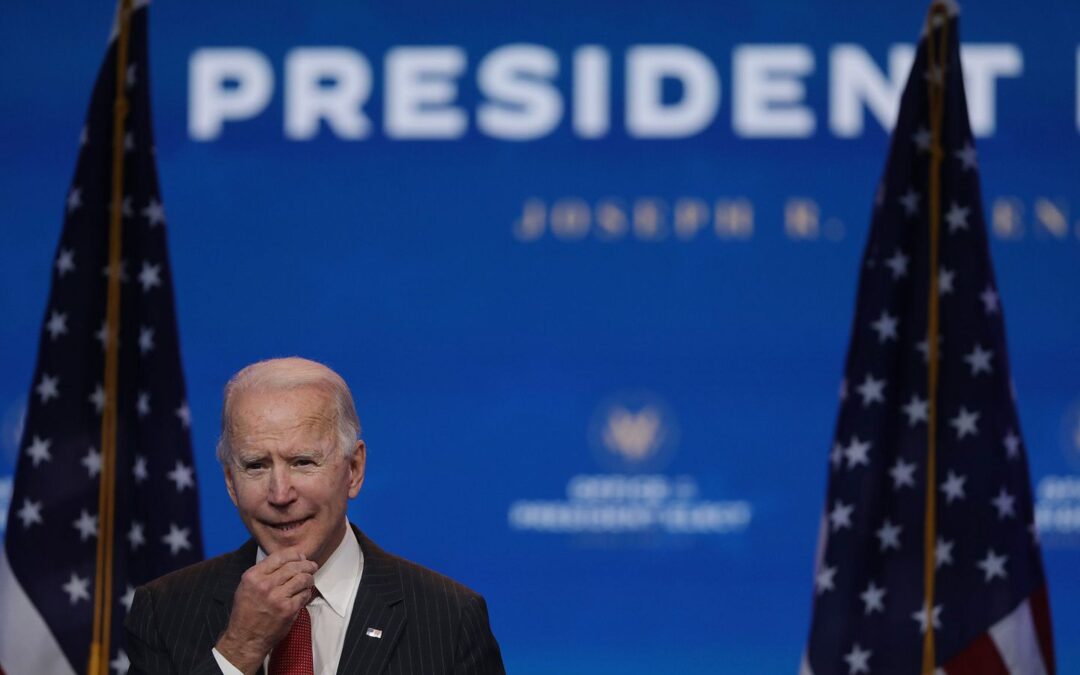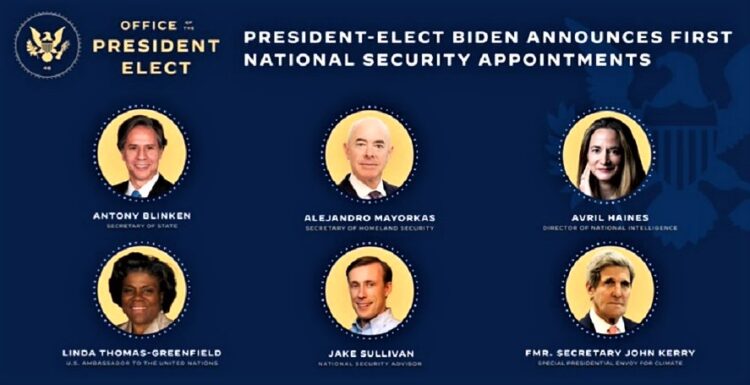President-elect Joe Biden will nominate the first Latino to lead the Department of Homeland Security, the first woman to head the intelligence community and a former secretary of state, John Kerry, to be his international climate czar.
Biden will also nominate Alejandro Mayorkas to be his secretary of the Department of Homeland Security, his transition office said, and Avril Haines to be his director of national intelligence.
He intends to name Kerry as a special presidential envoy on climate.
The transition office also confirmed reports on Sunday night that Biden will nominate Antony Blinken to be secretary of state and Jake Sullivan as national security adviser.
Biden will also nominate Linda Thomas-Greenfield to be ambassador to the United Nations and restore the job to cabinet-level status, giving Thomas-Greenfield, an African-American woman, a seat on his National Security Council.
Kerry’s job does not require Senate confirmation.
A statement released by the transition office said Kerry “will fight climate change full-time as Special Presidential Envoy for Climate and will sit on the National Security Council.”
To manage his domestic climate policies, Biden also will soon name a White House climate director, who will have equal standing with Kerry, according to transition officials.
The emerging team reunites a group of former senior officials from the Obama administration, most of whom worked closely together at the State Department and the White House and in several cases have close ties to Biden dating back years.
They are well known to foreign diplomats around the world and share a belief in the core principles of the Democratic foreign policy establishment — international cooperation, strong U.S. alliances and leadership but a wariness of foreign interventions after the wars in Iraq and Afghanistan.
The racial and gender mix also reflects Biden’s stated commitment to diversity, which has lagged behind notoriously in the worlds of foreign policy and national security, where white men are disproportionately represented.
The slate of picks also showed Biden’s determination to push forward with setting up his administration despite President Trump’s continuing refusal to concede or assist him, even as a small but growing number of Republicans lawmakers and supporters of the president are calling for a formal transition to begin.
If confirmed, Mayorkas, who served as deputy Homeland Security secretary from 2013 to 2016, would be the first Latino to run the department charged with implementing and managing the nation’s immigration policies.
A Cuban-born immigrant whose family fled the Castro revolution, he is a former U.S. attorney in California and began Obama’s first term as director of U.S. Citizenship and Immigration Services.
He will have to restore trust in the department after many key Democratic constituencies came to see it as the vessel for some of Trump’s most contentious policies, such as separating migrant children from their families and building a wall along the southern border.
Top immigration officials in the Obama administration recommended Mayorkas’s nomination as a way to build support with the immigrant community while satisfying moderates and career officials within the agency who are looking for a leader with a background in law enforcement.
Haines served as deputy director of the C.I.A. in the Obama administration before succeeding Blinken as Obama’s deputy national security adviser.
She, too, is a former aide to Biden, serving as deputy chief counsel to the Senate Foreign Relations Committee from 2007 to 2008 while Biden was chairman.
Haines also served as counsel to Obama’s National Security Council, helping him navigate legal issues around counterterrorism operations and pressing for more restraint to reduce civilian casualties.
If confirmed, Haines will be the highest-ranking woman to serve in the intelligence community.
The director of the C.I.A., now led by its first female director in Gina Haspel, reports to the director of national intelligence.
Thomas-Greenfield is a 35-year Foreign Service veteran who has served in diplomatic posts around the world.
She served from 2013 to 2017 as assistant secretary of state for African affairs.
Just as important in the view of Biden officials is her time as a former director general and human resources director of the Foreign Service; they see it as positioning her to help restore morale at a State Department where many career officials felt ignored and even undermined during the Trump years.
Thomas-Greenfield, who recently recounted joining a “still very male and very pale” foreign service decades ago, has also served as the U.S. ambassador to Liberia and has been posted in Switzerland, Pakistan, Kenya, Gambia, Nigeria and Jamaica.
Perhaps the biggest surprise was Biden’s decision to bring back Kerry in a new role that would signal the new administration’s commitment to fighting climate change.
Kerry, 76, is a former, longtime Senate colleague and friend who campaigned for Biden through some of his candidacy’s darkest days and, Democrats say, retains his voracious appetite for international affairs.
Since serving as Obama’s second secretary of state from 2013 to 2017, Kerry elevated his longtime interest in climate to his signature issue and currently runs an organization dedicated to the topic.
His will be a full-time position.
“We have no time to lose when it comes to our national security and foreign policy,” Biden said in a statement provided by his transition office. “I need a team ready on Day 1 to help me reclaim America’s seat at the head of the table, rally the world to meet the biggest challenges we face, and advance our security, prosperity, and values. This is the crux of that team.”
“These individuals are equally as experienced and crisis-tested as they are innovative and imaginative” he added. “Their accomplishments in diplomacy are unmatched, but they also reflect the idea that we cannot meet the profound challenges of this new moment with old thinking and unchanged habits — or without diversity of background and perspective. It’s why I’ve selected them.”
In Blinken, 58, Biden chose a confidant of more than 20 years who served as his top aide on the Senate Foreign Relations Committee before joining his vice-presidential staff, where he served as Biden’s national security adviser, then principal deputy national security adviser to Obama and then deputy secretary of state from 2015 to 2017.
Blinken is widely viewed as a pragmatic centrist on foreign policy who, like Biden, has supported past American interventions and believes the United States must play a central leadership role in the world.
Biden likely calculated that the soft-spoken Blinken, who is well regarded by many Republicans, will face a less difficult Senate confirmation fight than another top contender, the former national security adviser Susan Rice.
Blinken began his career at the State Department during the Clinton administration.
He spent much of his youth in Paris and attended high school there, and is a graduate of Harvard University and Columbia Law School.
Sullivan will take the White House’s top national security job, and at 44 when he takes office, will be the youngest person to hold that position after McGeorge Bundy, who took over the job at age 41 under President John F. Kennedy.
Long viewed as one of his party’s brightest upcoming talents, Sullivan followed Blinken as Biden’s top national security aide and then ascended to become a senior aide to Secretary of State Hillary Clinton, who has called him a “once-in-a-generation talent.”
Along the way, Sullivan found admirers even among conservative Republicans in Congress while playing a key role in the negotiations leading to the 2015 Iran nuclear deal.
A Minnesota native and Yale Law School graduate, Sullivan in recent months has helped spearhead a project at the Carnegie Endowment for International Peace re-conceiving U.S. foreign policy around the needs of the American middle class.

